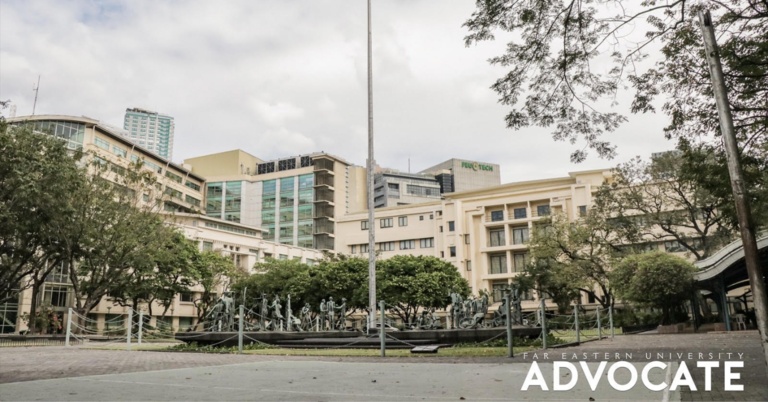
Panunupil ng rehimeng Marcos Jr. sa katubigan, patuloy—mga mangingisda
- November 23, 2024 15:38
FEU Advocate
October 18, 2024 15:14

By Mark Vincent A. Durano
Progressive groups decried the heightening condition of hunger and food insecurity in the country brought by neoliberal policies of the Marcos Jr. administration in a demonstration at the Department of Agriculture (DA) on ‘World Food Day’ that they dubbed as ‘World Hunger Day,’ last October 15.
Peasants, fisherfolk, urban poor, and consumers clamored empty pans, pots, and ladles against the DA gate to symbolize the worsening state of various sectors in providing food.
Against agricultural products
In her speech, Bantay Bigas Spokesperson and Gabriela Women’s Party second nominee Cathy Estavillo slammed the United Nations’ theme for World Food Day, ‘Right to foods for a better life and a better future,’ as opposite to what the nation is experiencing amid imperialist and neoliberal policies.
The spokesperson used Executive Order (EO) No. 62 as an example that lowered tariffs on agricultural products from 35 to 15 percent until 2028.
In line with the EO, Estavillo claimed that the government eyes to lower the price of rice through an influx of rice imports, prompting income loss for local farmers.
“Nagresulta po ‘yan ng todo-todong pagkalugi ng presyo ng palay ng ating mga magsasaka kung saan sa ngayon ay nabibili na lamang sa P14 hanggang P16 per [kilogram] ang palay ng mga magsasaka (It resulted to an intense income loss of farmers where the price of rice can be bought for P14 to P16 per kilogram),” she elaborated.
In addition to imports, around 35,000 metric tons of galunggong (mackerel scad) will be imported to the Philippines according to Makabayan Coalition Senator and Vice Chairperson Ronnel Arambulo.
The vice chair asserted that only the DA will benefit from the import amid the foreign-centric trade.
“Ang pangunahing bibigyan ng pagkakataon para dito sa importasyon ay ang mga registered importers na 80 percent ay mula sa commercial fishing sector at bahagi diyan ay ang [DA] Secretary na si Francisco Tiu-Laurel [Jr.] (Registered importers will be given priority for the importation wherein 80 percent came from the commercial fishing sector which DA Secretary Francisco Tiu-Laurel Jr. is a part of),” he said.
Moreover, Arambulo shared inconsistencies in data presented by the Bureau of Fisheries and Aquatic Resources saying that the country produces 42.3 million metric tons of fish every year while an average person eats 37 kilos of fish yearly.
With a population of over 100 million Filipinos, Arambulo claimed that the country’s production is overflowing which makes excessive imports unnecessary, made possible by the Fisheries Administrative Order No. 198.
The groups also blamed the government for the continuous crisis that the agricultural sector experiences, with programs that are dubbed as “artificial.”
Estavillo denounced DA’s Rise-for-All program for its claims to alleviate the price of rice.
Consumers, including mothers, have to line up as early as 2 a.m. in Kadiwa to buy products including a P29-priced rice per kilogram which is only available on Thursdays and Fridays, according to the spokesperson.
Additionally, Estavillo cited the P64 food threshold by the Philippine Statistics Authority as insufficient to meet Marcos Jr.’s promise to obtain food security by the end of his term.
“Pero ito ay hinahamon natin itong datos na ‘to dahil ‘yung P64 kulang na nga ‘yan doon sa isang meal o isang kain (But we are challenging this data because this P64 cuts short to even buy one meal),” she added.
Last month, the inflation rate of the Philippines eased to 1.9 percent which Estavillo regarded as inconsistent with what market prices have.
“Nananatiling mataas ang presyo ng pangunahing pagkain sa palengke. ‘Yung binabanggit nila na kamatis ay P50 na lang, P100 na po ngayon. ‘Yung bigas na meron nang P43, wala po tayong nakikitang presyo niyan (The price of main market produce remains high. They mentioned that the price of tomatoes is P50 but it is P100 now. We also cannot see a price of P43 for rice),” she justified.
Another Makabayan Coalition Senator and Kadamay Secretary-General Mimi Doringo also urged the government to provide support for farmers to be able to sell products at a lower price on their own.
The urban poor cannot afford to buy nutritious food due to high-costing taxes and lack of services for Filipinos, said Doringo.
“Matataas ang kinokolekta ng mga maya’t mayang kinokolektang mga buwis mula sa ating lahat mula sa mga binibili natin, mga kinokonsumo natin, pero bakit hanggang ngayon wala pa ring maayos na serbisyo para sa mamamayang Pilipino (The frequently collected taxes from our consumed products are high but why is there still no good service for Filipinos up until now)?” she questioned.
The demonstration also encouraged the issuance of incentives for farmers’ land and product development.
Escalating trends
Makabayan Coalition Senator and Chairperson Liza Maza mentioned in the program that 20 million Filipinos are hungry according to a survey by the Social Weather Stations.
“20 milyong Pilipino na ngayon ay kumakalam ang sikmura dahil sa kapabayaan ng gobyerno mula pa noon dahil hindi pinapatupad ang kahilingan ng mga magsasaka—ang tunay na reporma sa lupa, pero lubha pang inaatake ng mga korporasyong agrikultural, ‘yung mga korporasyon na nasa produksyon ng pagkain (20 million Filipinos have churning stomachs due to the government’s negligence since then because the farmers’ requests are not granted—true land reform, but they are severely attacked by agricultural corporations, corporations that are in the production of food),” she said.
The same survey also said that 14.2 percent of Filipino families experience involuntary hunger or “being hungry and not having anything to eat.”
Updated data saw a higher score compared to 12.6 percent last December 2023 while it was 3.5 points above the annual hunger rate of 10.7 percent last year.
Additionally, the Philippines ranked 67 out of 127 countries in the 2024 Global Hunger Index (GHI) with a score of 14.4 which is considered as moderate hunger. Despite garnering an improved score from 14.8 in 2023, the country dropped by one rank this year.
It also reported that 5.9 percent of the population is undernourished, 26.7 percent of children under five are stunted, 5.4 percent of children under five are wasted, and 2.7 percent of children die before their fifth birthday.
Moreover, The State of Food Security and Nutrition in the World 2024 states that around 713 to 753 million or one in 11 people were undernourished globally in 2023.
With these trends, about 582 million people could be chronically undernourished by 2030.
Additionally, the report also added that 2.33 people faced moderate or severe food insecurity while 864 million went with their day without food. Around 2.8 billion people were also said to be unable to afford a healthy diet in 2022 especially in low-income countries where it comprises 71.5 percent of the entire population.
(Photo by Mark Vincent A. Durano/FEU Advocate)









